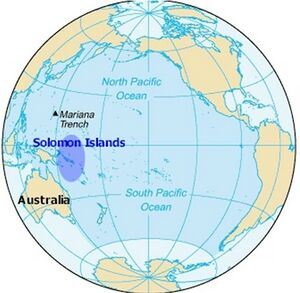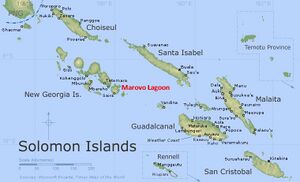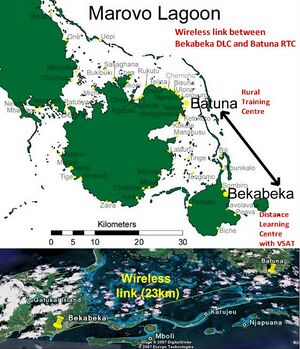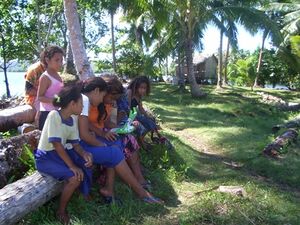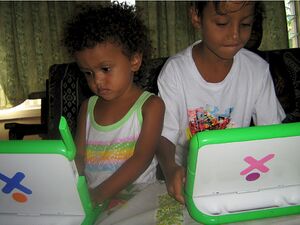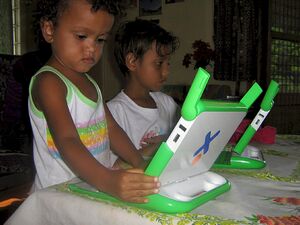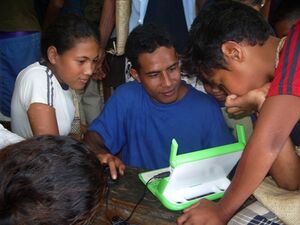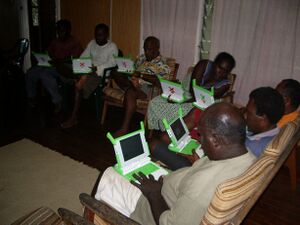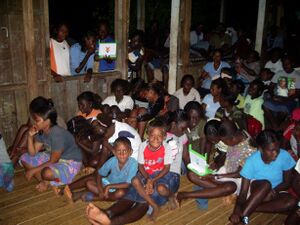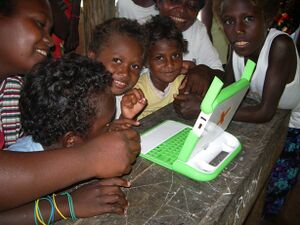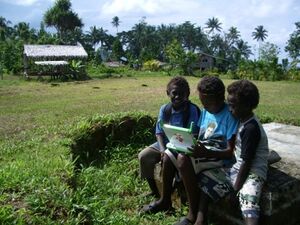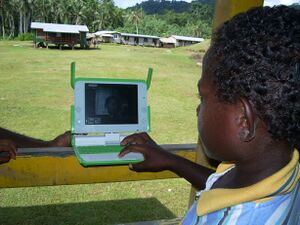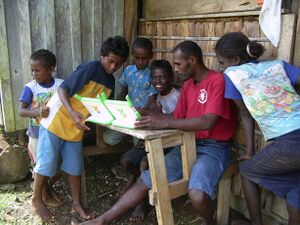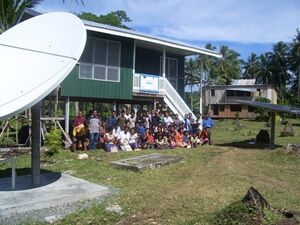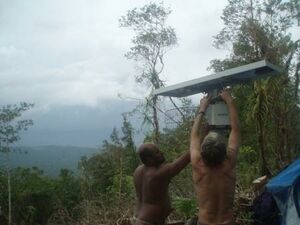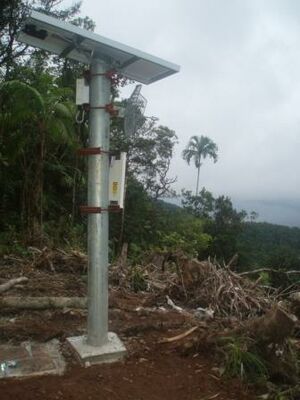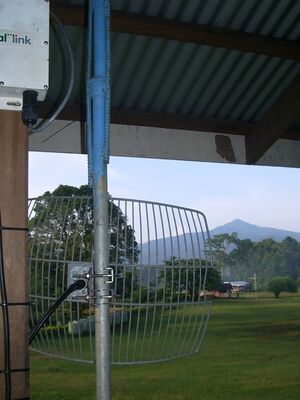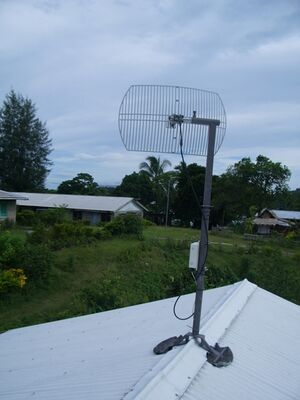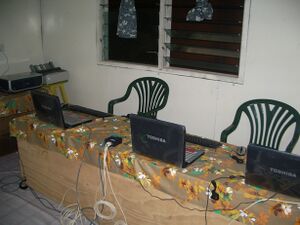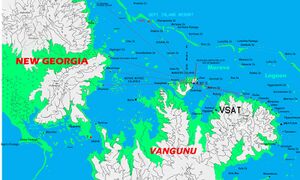OLPC Solomon Islands
Cook Islands -French Polynesia - Kiribati - Nauru - New Caledonia - Niue - Palau - Papua New Guinea - Samoa- Solomon Islands - Tonga - Tokelau - Tuvalu - Vanuatu
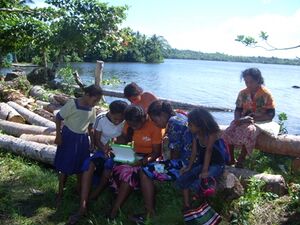
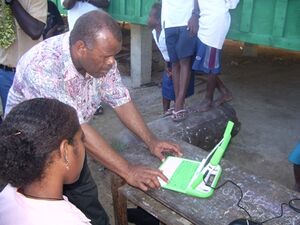
Solomon Islands, north of Australia and part of Oceania, is the first site in the Pacific region to have a substantial program of OLPC laptops in remote schools. The entire Pacific region is represented by the Secretariat of the Pacific Community (SPC), Dr Jimmie Rodgers Director-General. The many islands that make up the Solomons are served by 9 VSAT satellite dishes on sites denoted as Distance Learning Centres. These were established using EU funding, and are administered by the Ministry of Education and Human Resource Development. The project is named the Distance Learning Centres Project (DLCP).
Pilot sites are located at Bekabeka, Patukae and Batuna primary schools on Gatokae island in the Western Province of the Solomons, where they currently share 22 B2 and 10 B4 laptops. The machines at Bekabeka already have access to satellite signals via a VSAT which is now connected to Batuna via wireless networking. Patukae will be connected via another VSAT installed under the SPC's Pacific RICS programme in May 2008.
As part of the current trials with 75 gifted XO-1s, the whole of Year 1 will be saturated in Batuna and Patukae primary schools, with Bekabeka to follow. It is expected that this will commence in the last week of June 2008.
Projects for both the languages below have been opened in the OLPC Pootle server for localisation:
We are also working on localising the text-to-speech synthesisor (Speak activity) for Pijin.
To view the Solomons initiative within the broader Oceania effort, see OLPC Oceania.
Videos from Bekabeka
- Small boy inside: Children learning from each other.
- Jari girl outside : Girls in control...
- Hand over training at Batuna: Short video of a training session handing B4 XOs to Batuna children
Contacts
Contact: David Leeming, Technical Advisor to People First Network (PFnet), Honiara, Solomon Islands
The following people have also been instrumental in the evolution of this project:
- Dr Jimmie Rodgers, Director General, Secretariat of the Pacific Community (SPC)
- Ian Thomson, 2020 Communications Trust, New Zealand
- Rangan Srikhanta, Executive Committee, UN Association of Australia (NSW Branch)
- Sam Taufao, IT Manager, SPC
- John Budden, Economic Infrastructure Advisor, Pacific Islands Forum Secretariat
- Technical Working Group let by Dr Robert Whelan, University of the South Pacific (USP)
Latest News
The Internet Society, ISOC has announced project funding of USD $10,000 towards the Marovo Learning Network project, which includes the Solomon Islands Trials for OLPC.
Country context
Despite the favourable developments in recent years, the position of many Pacific Islands countries (PICs) in terms of educational performance remains among the poorest in developing countries. For example, according to recent population statistics, the Pacific population in the age group 6-17 years is estimated to be over 2 million. Of this, over half is not at school. Over 90% of those not at school are located in rural areas and outer islands .
If we look at the latest census data for PNG, Samoa, Solomon Islands, Kiribati, FSM and Tuvalu, there are more than 1.77 million 6-17 year olds. In the Solomons we can see that of a population of about 410,000 there are 124,000 (30%) in the 6-17 year age group, of whom 40% are not at school. In rural areas, the non-attendance rate is much higher. In other PICs, the percentage of young people is even higher – 58% of the population of Kiribati are 25 years or younger. The challenges facing the PICs to support and improve the livelihoods and services of these majority populations in rural areas are immense. Many national reports point to the lack of infrastructure, essential services, basic hygiene, primary education, high costs and poor quality of services as major hurdles. The challenges to reach out to remote and rural communities are substantial but the advent of new technologies that are robust, low cost to deploy and operate, portable and that integrate with Internet connectivity provide opportunities that were not previously available.
In this task, the high proportion of young people will work favourably. It has been shown that young people are by far the group most likely to take up new technologies and become active in the global flows of information . Young people are therefore an ideal group to focus on, in leveraging ICT for development.
PFnet and DLCP
In the Solomons People First Network (PFnet) [1] was started in 2001 through a UNDP programme as a community networking service to reach (some of) the 85% of people living in rural areas. After set-up, PFnet is an ultra low cost model – using HF radio email and solar power. All the "email stations" are community-managed and the network grows as new groups mobilize and come forward to request stations. PFnet follows a bottom-up approach where everything depends on a strong pillar of community support and their active participation.
In 2002, PFnet was involved in distance learning trials with the University of the South Pacific (USP)’s Honiara Centre. This led to the Distance Learning Centres Project (DLCP) [2] being included in the EU and NZAid-funded Education Sector Investment and Reform Programme (ESIRP).
The Distance Learning Centres Project (DLCP) is establishing rural learning centres equipped with VSAT broadband access, building on the well-tested PFnet model to ensure community partnership/ownership and sustainable multi-use operation. In this context, the Ministry of Education sees the OLPC initiative as having potential for further expanding the DLCP model to reach out further into the communities and remote areas, with linkages to a full spectrum of educational services - literacy, livelihoods, academic, technical, teacher professional development.
The Ministry of Education priorities under their National Education Action Plan (NEAP) are to strengthen basic education for all, including continuing education and technical and vocational education and training (TVET). The need is greatest in rural areas and the DLCP is one component that addresses this by creating new learning opportunities through the distance mode. The Ministry wants to expand the DLC network to other schools and education institutions such as Rural Training Centres. In this respect, DLCP is collaborating with the S.I. Association of RTCs (SIARTC) to develop an ICT strategy for TVET.
Furthermore, the Curriculum Development Centre (CDC) of the Ministry is currently undergoing reform, in which the potentials of ICT – including that existing, such as the DLC network, etc - are to be assessed for integration into the national curriculum.
Pacific RICS – Pacific Rural Internet Connectivity System
The availability of Internet access is critical to programs that wish to interact and exchange information with remote communities, and the satellite broadband VSAT technology is very appropriate for the purpose. Furthermore, it can be extended to surrounding areas through terrestrial wireless “Wi-Fi / Wi-Max” coverage. In this context, SPC has recently announced that funding has been obtained for a Pacific Rural Internet Connectivity System (Pacific RICS) that will utilise a new VSAT hub and improved regional satellite coverage as a result of the AMC23 satellite, to provide access for remote communities in the PICs. It is hoped that the OLPC sites will benefit from the RICs programme.
Marovo Learning Network
Two wireless networks aimed at education are emerging in Marovo Lagoon. These are
- Eastern Marovo network connecting to the VSAT at Bekabeka Distance Learning Centre under the EU-funded DLCP project, and
- Central Marovo network to be connected to the VSAT at Patukae school, under the Secretariat of the Pacific Community's RICS programme.
The former has been completed.
The Ministry of Education, via DLCP, has been collaborating with regional organisations including the Secretariat of the Pacific Community (SPC) and University of the South Pacific (USP) to develop a regional plan for OLPC linked to the Pacific Islands Forum's Digital and Youth Strategies, with SPC taking a lead role.
As part of a series of proposed regional pilots to test models and assumptions prior to a full-scale roll-out, trials are being run in the Marovo Lagoon area of Solomon Islands. The trials are implemented by the DLCP in collaboration with other regional organisations, as part of a wider initiative known as the Marovo Learning Network, with the following objectives:
- To demonstrate how VSAT access can be extended to surrounding areas through terrestrial wireless coverage
- To extend the impacts of the distance learning centres to technical and vocational education and training (TVET)
- To demonstrate the OLPC laptops in a rural village setting and measure their impacts
To provide connectivity, a wireless link is being established between Bekabeka DLC and Batuna Rural Training Centre (RTC). The geography is suitable for wireless networking with villages scattered around the lagoon-side with good lines of sight.
A number of organisations are collaborating with DLCP, Batuna RTC and the Marovo community in this project.
- SPC
- 2020 Communication Trust (New Zealand)
- University of Queensland (UQ), Marine Science Department
- USP
- Conservation International
- American Museum of Natural History
- Internet Society
- The Waikato University part-owned company Rural Link provided technical support and the hardware for the wireless networking, with thanks to Prof. Murray Pearson.
Batuna is central in Marovo Lagoon and is a social and economic hub. Besides the large RTC, there is a secondary school and the main clinic for the Lagoon. Connecting Batuna RTC and then linking to the clinic, providing public access and so on, would be expected to create many positive development outcomes. Marovo Lagoon is a globally unique environment with diverse natural and cultural assets that make it the premier tourist destination regionally and recognised as a potential World Heritage site globally. Unfortunately the abundant natural resources of Marovo has attracted commercial exploitation by logging and fishing companies and led to significant environmental and social impacts.
Under the SPC's Rural Internet Connectivity System (RICS) programme [3], a VSAT will be located at Patukae school in the beginning of 2008. As of mid-February, the equipment is arriving in country. A suitable site for a wireless access point connected to the VSAT has been identified with the potential of connecting 10-15 other schools.
Linking the OLPC trials to conservation and environmental education
A key tactic in the trials is to link the distribution of the laptops to existing educational programmes in Marovo Lagoon. These programmes can be delivered, monitored and managed through the laptops and supporting infrastructure.
In order to establish the wireless link, collaboration has been formed between DLCP and 2020 Communication Trust.
Support has been pledged for the support of the operating costs of the Batuna facility for the first 3 years, through the University of Queensland (UQ) Conserving Marine Biodiversity in Marovo Lagoon project, which is attempting to addresses the unsustainable extraction of natural resources and subsequent environmental impacts.
Marovo communities have expressed a desire for stronger local capacity to manage the environment and biodiversity of Marovo Lagoon through appropriate application of cultural knowledge and systems. The UQ project aims to achieve this through the establishment and implementation of locally-based resource management strategies, facilitated and supported through the provision of expert scientific, anthropological and legal advice. One of the key components in building a local environmental governance capacity is education. The OLPC platform will provide a means to distribute locally appropriate environmental education materials across a broad spectrum of the community. Educational materials available electronically would complement UQ’s existing hard copy materials and open up possibilities for wider distribution across the DLC and OLPC networks, focusing on young people and working with schools in the communities.
The UQ team have expressed an interest to assist in the development and use of the proposed DLC link to the Batuna RTC. UQ are already working both with Marovo communities directly, and with the Ministry of Education to ensure complementarity with the national curriculum.
Furthermore, Conservation International (CI) and the American Museum of Natural History (AMNH), who also have conservation programmes in Marovo Lagoon, have also expressed an interest in collaborating in order to leverage the new networks created by DLC and OLPC.
Over the past five years, CI has pioneered in the implementation of such agreements in a wide variety of contexts around the world, most recently in collaboration with the AMNH in the Morovo Lagoon of the Solomon Islands. AMNH has been active in conservation and basic scientific research projects the Solomon Islands for the past ten years.
Collaboration for communication, social development and natural resource management in the Marovo Lagoon is therefore proposed.
CI and AMNH propose to utilize the networks created by DLC and OLPC to support the development of a network of community conservation agreements on Gatokae Island and the neighbouring Morovo Lagoon. Broadband access would facilitate more effective management and protection of the area’s extraordinary biological diversity via direct communication among community conservation staff as well as between local conservation managers and regional support staff in Honiara.
The network would also provide invaluable communication between conservation managers in Morovo and other community conservation projects in the Solomon Islands and around the world via a community conservation “learning network” that Conservation International is currently developing. A technical working group on OLPC has been created at the University of the South Pacific and they will be consulted in the project design and implementation.
The OLPC Solomon Islands Trials
OLPC trials will be conducted in Batuna and Patukae, in association with their communities, the Batuna RTC and the schools. The pilot will use the 12 B4 units donated by OLPC for familiarisation and will attempt to procure more for the full trials.
The specific objectives of the trials are to design an OLPC implementation plan using participatory development methods, involving a wide range of stakeholders from the grassroot communities through to service providers, the Solomon Islands government and their development partners, and then to:
- Distribute the OLPC laptops already obtained by the MEHRD (DLCP) to target school-age individuals in a selected community at Batuna and build capacity of children, school teachers and other resource persons in their use;
- Provide Internet access and a sustainable resource centre at Batuna and Patukae to which the OLPC network will connect, and which will provide ongoing support and access to server-based resources;
- Demonstrate how educational programmes can leverage the OLPC laptops to deliver educational content. The collaboration suggested in this document is ideal for a pilot, because the driving force for the trial already is in place. It is envisaged that MEHRD and other providers will eventually develop content for this mode, but this takes time. Therefore, the strategy will be to:
- Partner with two or more existing projects in Marovo with strong educational components and existing content and interactivity that could be delivered through the eLearning mode; namely (i) the UQ Conserving Marine Biodiveristy in Marovo Lagoon project and (ii) Conservation International and the American Museum of Natural History’s Marovo programmes;
- Create an eLearning presence in the Curriculum Development Centre and use the above-mentioned programs as a case study to develop capacity that can then be applied to meet the curriculum development needs of the Ministry;
- Develop a curriculum implementation plan based on the above;
- Build partnerships to ensure the ICT networks are sustainable, and that address community ownership and buy-in, financial sustainability, growth, and capacity;
- Monitor and evaluate the impacts of the OLPC trials, disseminate results and make recommendations to the Solomon Islands Government and stakeholders, OLCP Oceania Organisation and regional stakeholders for follow-on large scale roll-out.
Objective measurements and research questions
The measurements to be made, and questions to be raised by the pilot, will concern the following:
- Implementation: what is the best way to distribute the laptops to children?
- What usage patterns develop in the user group?
- Do the laptops impact on literacy, numeracy, and information literacy in the students and their families, and communities, and if so, how?
- What are the most effective ways of delivering educational content using the XOs, and how effective are they for this purpose?
- How can the educational usage be directed towards meaningful ends, such as livelihoods, employment and further education?
- How can the laptops best be made to assist teachers in the classroom in the delivery of the curriculum?
- How can teaching practices be adapted to make best use of the laptops in the classroom?
- What are the most practicable method that PICs can adopt for creating local content linked to the needs of their educational systems?
- What recommendations can be made in terms of national collaboration to achieve optimum impacts from the distribution of the laptops, including towards the MDGs?
- What national policy recommendations can be made to create an enabling environment for this purpose?
- At the end of the pilot period, are there any measurable differences in attitudes to learning in the laptop owners group as opposed to a control non-owners group?
- Are there any changes in the attendance rate of school students participating in the pilot?
- What impacts/changes are observed within the village society as a result of the distribution of laptops,?
- What risks can be avoided and advantages encouraged?
- How well do the laptops perform in technical terms: networking, accessing content, power requirements, response to harsh environment?
- What are the main technical challenges and risks for a larger regional roll out and what strategies can recommended to meet them?
The pilot will also measure the actual total costs in terms of finance and of time of participants, and identify key indicators for future rollouts.
A fuller, detailed set of measurements and research questions will be agreed in consultation with the stakeholder groups. Questions will then be grouped into sections on planning/analysis, project design, implementation, and evaluation. The research methods, which may include focus groups, data collection, interviews, survey, observation and other methods will also be clarified at that time, and will refer to the literature for frameworks on measuring impacts of ICT in education.
Pre-trial familiarisation programme
Ten B4 prototypes have been circulated through the three sites involved in the trials, namely Bekabeka, Batuna and Patukae. The process involved:
- Establishing a local committee with membership from the primary school and wider community to oversee decision making such as the process for distributing laptops and coordinating with the project;
- An initial hand-over training for ten selected standard 1 (6-7 years) students plus older "mentors" and their teachers;
- A period in which the students "own" the laptops and are encouraged to use them at every opportunity, and their teachers to consider ways of using them in class work;
- Feedback will be obtained through questionnaires sent to the teachers, who will note their observations and also consult with parents and the students themselves.
The purpose of this exercise is to gain early indications that will assist in the design of the main trails, and to cement the partnership with the communities.
- The school generator was turned on at lunch time to allow mid-day recharging as well as the evening.
- During the familiarisation activities, only Bekabeka school had Internet connectivity.
At this stage we can only describe some initial subjective impressions:
- Great enthusiasm prevailed throughout, including with the teachers;
- Students acquired user skills at different rates. The quicker ones immediately began to help the others;
- The most popular activities were Record, Speak, Chat and TamTamMini;
- Teachers began to see the potential for specific learning objectives very quickly. For instance, the Speak activity as a tool for literacy training.
Problems that we noticed included:
- About 30% of the batch suffered from severe touch pad instability. This could only partly be reduced using the "four finger salute";
- One battery failed after a few weeks;
- It was recognised that the early age children, 6-7 years, have the potential to gain most from the laptops in terms of acquiring learning skills. However, most children in this age group needed quite a lot of assistance in the early stages to learn the basic keyboard skills and understand the basics of using the device
Outcomes of this exercise:
- A standard process for handing over the laptops to a group of children, involving a lesson plan, older students as mentors and full participation of primary school teachers;
- A participatory process to ensure the community has ownership and is empowered to make collective decisions regarding the project.
- A distribution plan for the main trials, involving rotating ownership. The committees at Batuna and Patukae both agreed on a system whereby groups of students (according to the numbers of laptops to be procured) will "own" the laptops in rotation, with periods of 1-2 weeks. This will ensure that everyone is included in the trials and that there are no disputes or jealousies. It will also widen the study group despite the limited numbers of laptops available.
We also tested the robustness of the laptops with an unplanned drop test! Five of the laptops experienced an accident when they fell from a railing 2m onto concrete. There was no damage observed to any of them! However, we do not intend to repeat the test!
Progress as of Jun 2008
The following outputs have been completed.
- Demonstrations made with B2 laptops at distance learning centres at Henua, Rennell and Vuranimala, Central Province. [4]
- Community consultations with Batuna RTC and community and community agreement signed.
- Collaboration with Rural Training Centres initiated.
- Consultations held and support obtained from Bekebeka Community High School
- Agreement made with UQ on salary support for a Batuna-based resource person and trainer, for 3 years. A suitable person, Mrs Elnah Tati, has been recruited.
- 2020 Communications Trust successful in obtaining USD 15,000 from Global Knowledge Partnership (GKP) for the purpose of establishing the wireless learning network in Marovo Lagoon, including wireless equipment and computing equipment for Batuna RTC
- Curriculum Development Centre briefed and a focal point person identified, Mr Phillip Samani, to be the Curriculum Development Office with eLearning responsibility
- Wireless antennas installed at each end of the Bekabeka-Batuna link.
- Repeater site installed on Mt. Mariu
- Remaining wireless, solar and computing equipment ready to be installed in January 2008
- Batuna RTC computer centre operator Elnah started two weeks training at Bekabeka DLC
- 10 B4 laptops deployed with children selected by teachers at the local Primary School, Bekabeka (mid Nov 2007). The children have ben allowed to keep the laptops and their experiences will be recorded in January 2008. This is a "pre-trial" demonstration or familiarisation exercise (see video clips above).
- In February 2008 the 10 B4 laptops were handed over to Patukae Primary School for three days intensive familiarisation afterwhich the laptops were handed to Batuna Primary School where they will remain. Management committees for the trials have been launched at Batuna and Patukae.
- Trials with 75 gifted laptops to commence in June 2008 at Batuna and Patukae schools.
Regional outcomes linked to the trials:
- Panel session on OLPC in the Pacific held at the Pacific Chapter of the Internet Society's PacINET 2007 conference, held in Honiara, Aug 2007, featuring Dr Jimmie Rodgers, Director General SPC, John Budden, Infrastructure Advisor, Pacific Islands Forum Secretariat, Ian Thompson, 2020 Communications Trust, Rangan Srikhanta, Treasurer, UN Association of Australia (NSW Branch) and David Leeming, Manager of DLCP. [5]
- Presentation on OLPC made at the Forum Leader’s meeting in Tonga, October 2007, to Heads of State of many regional countries
- Presentation on DLCP featuring the OLPC trials amde by David Leeming at the Pacific Forum Education Minister’s Meeting, Auckland, NZ, Nov 28th 2007 [6]
- OLPC's Professor Barry Vercoe visits Bekabeka, Nov 2007 [7]
- ISOC announce $10,000 project funding towards the Marovo Learning Network initiave(Jan 2008) [8]
- Marovo wireless link established and Batuna online, Jan 2008
- Resources, literature and research about ICT4D and ICT in education in the Pacific Islands [9]
